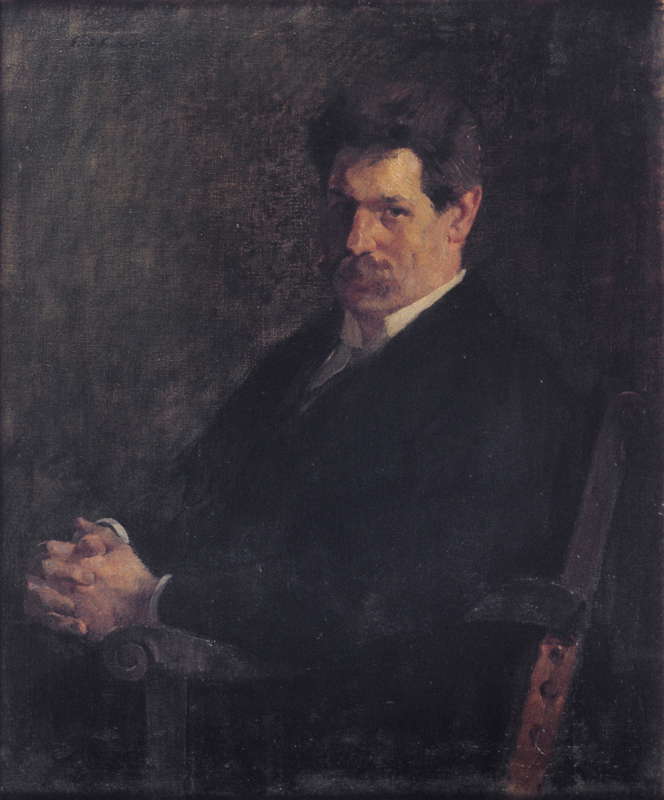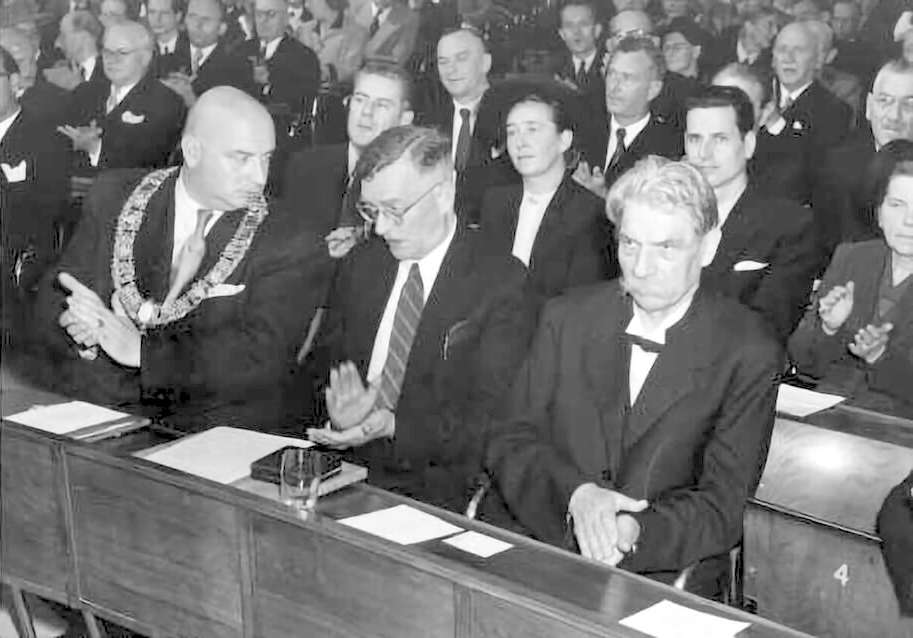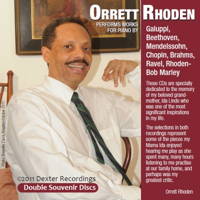 UPDATES: There's a new feature every day at Classical Music Daily. Read about the various ways we can keep in touch with you about what's happening here.
UPDATES: There's a new feature every day at Classical Music Daily. Read about the various ways we can keep in touch with you about what's happening here.
ALBERT SCHWEITZER: ERASED MUSICIAN?

A P VIRAG investigates a forgotten polymath
Albert Schweitzer was profiled in the great American magazine Life on 6 October 1947 with the headline: 'The Greatest Man in the World: That is what some people call Albert Schweitzer, Jungle Philosopher.'
Who exactly was this man?
Well, let us see:
Born in 1875 and died in 1965. Doctoral level degrees in Philosophy, Theology, Medicine. It is often claimed he had a doctorate in music for his book on Bach, though the exact status of this eludes me. I do not deny it, the details just elude me. He was also a Lutheran pastor and in 1952 he was awarded the Nobel Peace Prize. The reason for the award is given as:
'...for his altruism, reverence for life, and tireless humanitarian work which has helped making the idea of brotherhood between men and nations a living one ...'
(See nobelprize.org/prizes/peace/1952/schweitzer/facts)
Schweitzer wrote numerous books on theological subjects, the most famous being Quest of the Historical Jesus. He also wrote a giant biography with analysis of J S Bach, as well as critiques of Western Civilization and modern ethics. (Amazingly these books were published by the same publisher as brought out Oswald Spengler's Decline of the West. They make for a fascinating comparison covering as they do much similar ground, and yet being so vastly different.) Above all, Schweitzer sought for and believed he had indeed found an elemental idea that could reinvigorate modern ethics and civilization which he described by the deeply suggestive apothegm: 'Reverence for Life'.

1912 portrait of Albert Schweitzer by Émile Schneider
Along with his shelf full of books and articles, he performed many concerts of the music of Bach (and even César Franck) after his studies with the great organist Charles Marie Widor. He was very active in preserving historic organs in Europe and deeply investigated organ construction and design. He made numerous recordings as well.
But, it is as a medical doctor in Africa that engendered his great fame in his lifetime. After much soul searching he decided that training as a medical doctor and serving the people of Africa was the path his life should take. Thus, he gave up his academic and musical careers. He then spent many years in Gabon (at that time in circa 1910, part of the French colonial empire until independence in 1960) and the clinic (known as Hôpital Albert Schweitzer) that he established with his wife Helene Bresslau Schweitzer still exists. Albert Schweitzer continued his work in Gabon until his death in 1965. It was widely considered an act of the greatest self-abnegation for an intellectual of such vast achievements before he was thirty years old, to give up all and become a doctor in a remote portion of the world.
It was as both as a scientist and as a theologian/philosopher that Schweitzer also spoke out in the 1950s against atomic weapons, atomic testing and the dangers of atomic radiation. Some say he was one of the first to do so. Certainly, this Nobel Prize winner (1952) was amply positioned (and qualified) to draw attention to the dangers and risks of nuclear weapons. Remember, this was an era of 'good' atomic energy and the Cold War. Issues about atomic weapons, testing and the dangers of fallout were both new to the world and intricately involved in the political intrigue of the era.
It is also very interesting that published evidence indicates that Schweitzer was the victim of a governmental disinformation campaign designed to discredit him in the public eye for these very anti-nuclear opinions.
This theory, first broached in an article in 1995 - Blacklisting Schweitzer by Lawrence S Wittner, see: albany.edu/news/pdf_files/0903_Blacklisting_Schweitzer.pdf - has been followed by another book, Albert Schweitzer: Cold War Casualty by Patricia Morris, which provides further material obtained through required Freedom of Information legislation. Both discuss the situation in detail and are very much worth reading.
The article and the book are fascinating, and I recommend them highly. I leave others to decide the merit of their argumentation.
Now, if one looks over the world, one finds that Schweitzer's ideas keep percolating. I think it rather unexpected to say that his reputation has evaporated.
Consider, that in 1981 a six hundred page bibliography of some five thousand books, articles and such was published: Albert Schweitzer: An International Bibliography by Nancy Snell Griffith and Laura Person. On 15 November 2022 Google Scholar drew a list of some 96,000 links. Google on the same day gives eleven million hits. He has been the subject of several dramatic films and documentaries. His complete works were published in a German-Japanese bilingual edition in the late 1950s and I have read that his biography was apparently favoured by German authorities in the 1950s seeking a figure of indubitable moral status - untainted by Nazi connections - to provide an exemplar for the new generation.
Schweitzer's ongoing intellectual influence can be found in issue of bioethics, theology (in a very interesting and specific way) and what one author has dubbed 'The New Rationalism'. Mention of him even appears in Jacques Barzun's magisterial tome From Dawn to Decadence: 500 Years of Western Cultural Life (2000). Barzun writes:
Albert Schweitzer, musician, physician, philosopher, man of letters, and philanthropist. His detailed study demonstrated that Bach was not merely a master of complexity in music, but also a creator of drama in sound ... But Schweitzer's demonstrations of Bach's expressive intentions and results remain unassailable ...
To believe that Schweitzer's reputation has been effectively erased does not seem justified.

From left to right: Walter Kolb, mayor of Frankfurt, Adolf Grimme and Albert Schweitzer at the 1949 announcement of the founding of the German Academy for Language and Literature in the Paulskirche, Frankfurt, Germany
And yet ...
Schweitzer's medical activities have received a smattering of negative consideration. Schweitzer's colonial mentality has also received considerable investigation. However, some use is currently being made of Schweitzer's theology in re-envisioning Christianity in Africa.
Yet for all this, in a purely anecdotal mode based on my personal interactions, I have been interested that some highly educated, very cultured and widely read people do not know of him at all.
And so, might we for the moment consider that in fact some disinformation campaign was formulated against Schweitzer in the 1950s and early 1960s? The campaign may have been successful at the time, but has been bypassed by the very quality of Schweitzer's contributions.
And yet ...
Can we ask: Did the disinformation have an effect on his musical reputation?
I then took it upon myself to ask one of the foremost musicologists, keyboardists and activists for historical performance practice about Albert Schweitzer. He replied that no one remembers Schweitzer now.
This may be true in the musical world in spite of the lovely and detailed biography of Schweitzer at cantatas.com - there he is certainly remembered.
But, apart from one aspect of his thought (*), and without wishing to enter into a detailed debate, it seems to me that Schweitzer's theology, philosophy and medicine have been sidelined - I choose that word carefully - but, I believe it is true that Schweitzer has been 'forgotten' in music too.
This may be due to the effectiveness of the disinformation campaign. Or it may be due to aspects of Schweitzer's own opinions and thoughts about music, Bach and performance.
As far as the disinformation campaign I can find no evidence of it reaching into the world of music. Making use of the stunningly thorough bibliography mentioned above I find nothing but praise for Schweitzer in the music articles, save with a few reservations which one can attribute to musicians' ego/vanity or just the preferences of others. Some people could have been put off by Schweitzer as he cut into their own territory.
Still, the opinion of the musicologist mentioned above is interesting. Perhaps more Freedom of Information requests are in order with an emphasis on music.
I do not like conspiracy theories as they tend to go off the rails rather suddenly. However, the evidence of a campaign against Schweitzer initiated at a high level in fact exists and such facts are hard to dismiss.
In other ways the vanishing of his reputation in music is also in evidence. For example, I can find little mention that any other scholar/musicologist has followed up his theories of Bach's use of 'musical figures' for poetic ideas. I know of only one composer who is experimenting with similar techniques in a choral work currently in progress. Schweitzer's interest in the curved Baroque violin bow - Sol Babitz notwithstanding - has not garnered much consideration (though maybe that is picking up as well).
I will close with this question and suggestive reply - not an answer:
Was the musical career of Albert Schweitzer the subject of a disinformation campaign as were his medical and anti-atomic testing activities?
There is some information that a campaign against Schweitzer was initiated at high levels in governance. Some of these connections have been discussed in the materials already mentioned. I can see no direct evidence that this disinformation specifically targeted Schweitzer as a musician, but the decline of Schweitzer in music seems a plausible description of the facts. I know when I was a student in the 1970s he was considered a 'fuddy-duddy'.
Without wishing to be utterly facetious: I sense a novel (and movie) in the making.
However, I believe that this subject deserves consideration, investigation and that more Freedom of Information requests (especially in England, France and Germany) are required.
But more important, I believe that his memory should be revived, his music, theology, philosophy and medical practice should be deeply considered and widely known.
Copyright © 14 January 2025
A P Virag,
Carlstadt, Alberta, Canada





